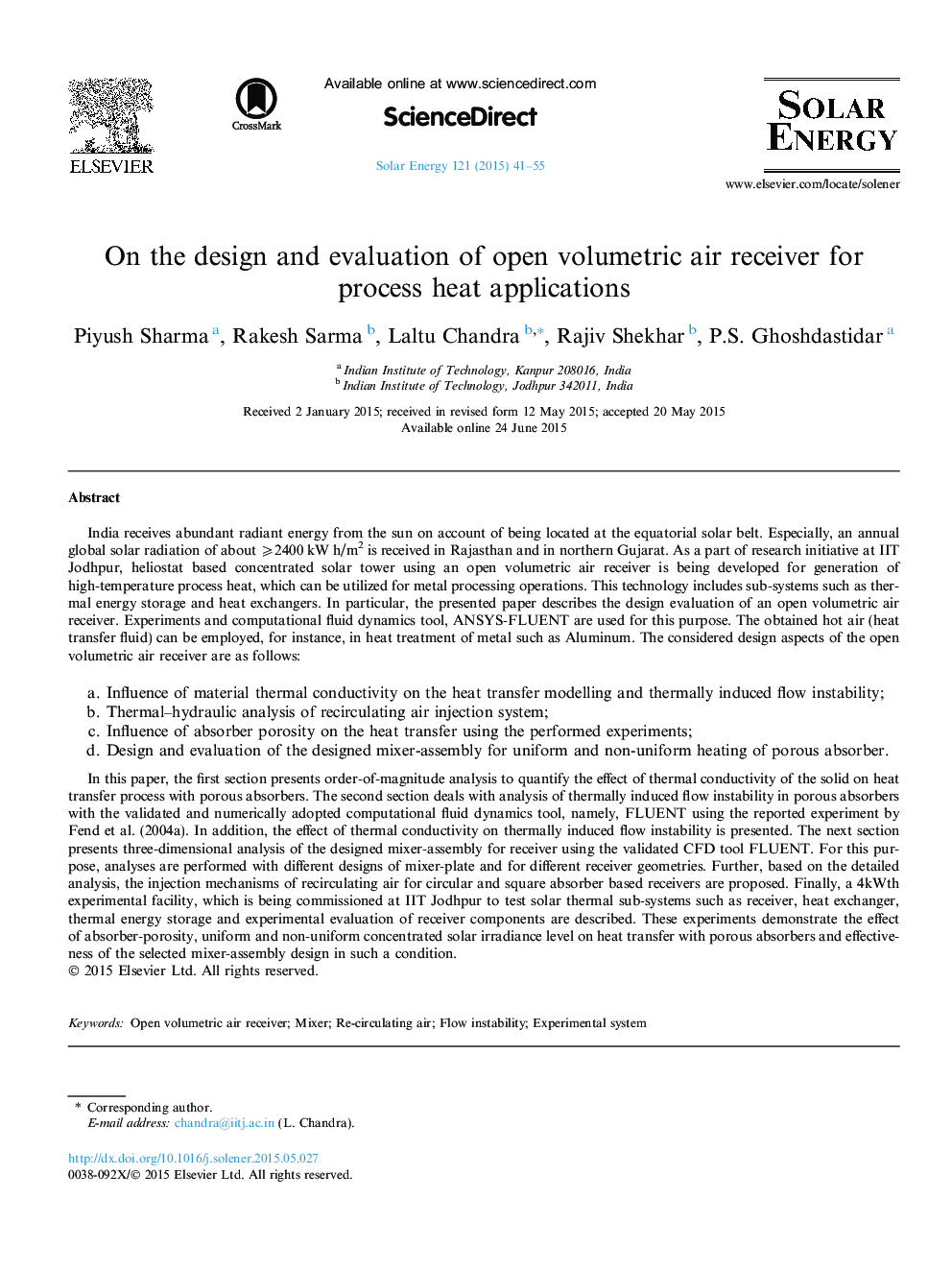| کد مقاله | کد نشریه | سال انتشار | مقاله انگلیسی | نسخه تمام متن |
|---|---|---|---|---|
| 1549663 | 1513097 | 2015 | 15 صفحه PDF | دانلود رایگان |
• A systematic theoretical, numerical and experimental evaluation of the designed Open Volumetric Air Receiver (OVAR).
• Influence of material thermal conductivity on heat transfer and on thermally induced flow instability.
• The effect of absorber porosity on heat transfer.
• The effect of uniform and non-uniform heating on porous absorber and effectiveness of mixer-assembly design.
• Satisfactory performance of the designed OVAR indicates its applicability.
India receives abundant radiant energy from the sun on account of being located at the equatorial solar belt. Especially, an annual global solar radiation of about ⩾2400 kW h/m2 is received in Rajasthan and in northern Gujarat. As a part of research initiative at IIT Jodhpur, heliostat based concentrated solar tower using an open volumetric air receiver is being developed for generation of high-temperature process heat, which can be utilized for metal processing operations. This technology includes sub-systems such as thermal energy storage and heat exchangers. In particular, the presented paper describes the design evaluation of an open volumetric air receiver. Experiments and computational fluid dynamics tool, ANSYS-FLUENT are used for this purpose. The obtained hot air (heat transfer fluid) can be employed, for instance, in heat treatment of metal such as Aluminum. The considered design aspects of the open volumetric air receiver are as follows:a.Influence of material thermal conductivity on the heat transfer modelling and thermally induced flow instability;b.Thermal–hydraulic analysis of recirculating air injection system;c.Influence of absorber porosity on the heat transfer using the performed experiments;d.Design and evaluation of the designed mixer-assembly for uniform and non-uniform heating of porous absorber.In this paper, the first section presents order-of-magnitude analysis to quantify the effect of thermal conductivity of the solid on heat transfer process with porous absorbers. The second section deals with analysis of thermally induced flow instability in porous absorbers with the validated and numerically adopted computational fluid dynamics tool, namely, FLUENT using the reported experiment by Fend et al. (2004a). In addition, the effect of thermal conductivity on thermally induced flow instability is presented. The next section presents three-dimensional analysis of the designed mixer-assembly for receiver using the validated CFD tool FLUENT. For this purpose, analyses are performed with different designs of mixer-plate and for different receiver geometries. Further, based on the detailed analysis, the injection mechanisms of recirculating air for circular and square absorber based receivers are proposed. Finally, a 4kWth experimental facility, which is being commissioned at IIT Jodhpur to test solar thermal sub-systems such as receiver, heat exchanger, thermal energy storage and experimental evaluation of receiver components are described. These experiments demonstrate the effect of absorber-porosity, uniform and non-uniform concentrated solar irradiance level on heat transfer with porous absorbers and effectiveness of the selected mixer-assembly design in such a condition.
Journal: Solar Energy - Volume 121, November 2015, Pages 41–55
